北师大版高二下Unit19《Language》(Lesson 2)ppt课件1
北师大版教案Unit 19 Language Lesson 2 Varieties of English
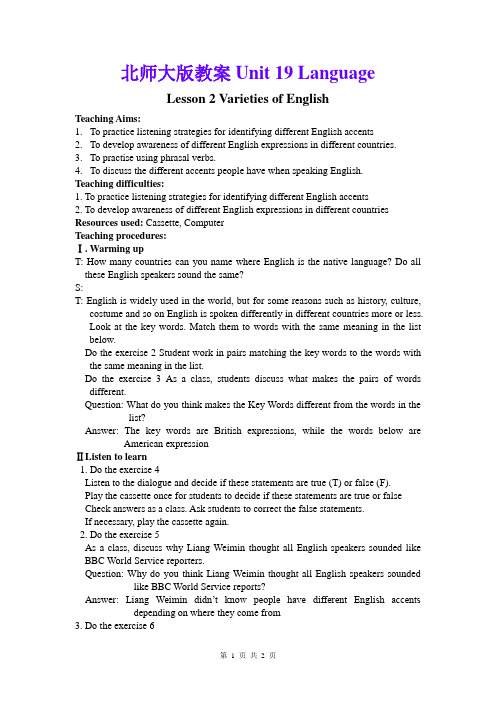
北师大版教案Unit 19 LanguageLesson 2 Varieties of EnglishTeaching Aims:1.To practice listening strategies for identifying different English accents2.To develop awareness of different English expressions in different countries.3.To practise using phrasal verbs.4.To discuss the different accents people have when speaking English.Teaching difficulties:1. To practice listening strategies for identifying different English accents2. To develop awareness of different English expressions in different countries Resources used: Cassette, ComputerTeaching procedures:Ⅰ. W arming upT: How many countries can you name where English is the native language? Do all these English speakers sound the same?S:T: English is widely used in the world, but for some reasons such as history, culture, costume and so on English is spoken differently in different countries more or less.Look at the key words. Match them to words with the same meaning in the list below.Do the exercise 2 Student work in pairs matching the key words to the words with the same meaning in the list.Do the exercise 3 As a class, students discuss what makes the pairs of words different.Question: What do you think makes the Key Words different from the words in the list?Answer: The key words are British expressions, while the words below are American expressionⅡListen to learn1. Do the exercise 4Listen to the dialogue and decide if these statements are true (T) or false (F).Play the cassette once for students to decide if these statements are true or false Check answers as a class. Ask students to correct the false statements.If necessary, play the cassette again.2. Do the exercise 5As a class, discuss why Liang Weimin thought all English speakers sounded like BBC World Service reporters.Question: Why do you think Liang Weimin thought all English speakers sounded like BBC World Service reports?Answer: Liang Weimin didn’t know people have different English accents depending on where they come from3. Do the exercise 6Ask students to read the strategies to the class in order to understand the listening skill.Play the cassette twice for students to listen and decide whether they are spoken in an American accent or a British accent .Check answers as a class by playing the cassette again, pausing after each sentence, and having students repeat the pronunciation which is the clue to the accent . Question: Can you identify a rule for the difference in the American and British pronunciation of the sound /a:/.Play the cassette twice to let students identify a rule for the difference in the American and British pronunciation of the sound /a:/.Answer: British pronunciation of the sound /a:/ but in American English is pronounced / æ/5.Do the exercise 7Play the cassette twice for students to listen and decide whether they are spoken in an Australian accent or a British accent.By playing the cassette check the answer and ask students to tell the reason, and pausing after each sentence. And having students repeat the pronunciation which is the clue to the accent.Question: Can you identify a rule for the difference in the Australian and British pronunciation of the sound /ei/Play the cassette twice to let students identify a rule for the difference in the Australian and British pronunciation of the sound /ei/Answer: British pronunciation of the sound /ei/ but Australian pronounces as /ai / 6.Do the exercise 8.Play the cassette once for students to listen and decide where the speakers come from.Play the cassette again and pause after each speaker for students to write down the words which have been pronounced differently with American, British or Australian accents.Check answer as a class and ask students to share rules they have noticed for the each country.ⅢListening1. Have individuals read out the listening strategies. Ask students if thesestrategies also apply when listening to Chinese.Do the exercise 9Listen to the Canadian travel dialogues. Use the Strategies to choose the correct alternative for each dialogue. There is one extra answer.Play the cassette twice for students to listen and answer the question2. When we speak English we must pay attention to expressing our idea indirectlyand politely and follow its custom and habit. Now let’s read through the Function File and see if they can match any of the expression with the gaps.Listen again and use these expressions to complete the Function File.3. Do the exercise 11Listen two or three times, pausing it for students to repeat the polite requestsⅣHomeworkWork in pairs. Student A and Student B turn to page 103。
高中英语 Unit19《Language》Lesson 2 Varieties of English 教案(2)北师大版选修7

英语:Unit19《Language》Lesson 2 Varieties of English 教案(2)(北师大版选修7)Teaching objectives:1.To practise listening strategies for identifying different English accents.2.To develop awareness of different English expressions in different countries.3. Identify situations and peopleTeaching difficulties: Identify situations and peopleTeaching aids: ComputerTeaching Procedure:Step1Warm up1.Discussion:1)How many countries can you name where English is the native language?2)Do all these speakers sound the same?2.Write down the words with the same meaning.1.mail_______2.movie______3.sidewalk_______4.trash_____5.Apartment_________Step2Listening1.Listen to the dialogue and decide if these sentences true (T) or false (F)1.Pam is American. ( )2.Robert comes from Australia. ( )3.The more different accents you hear the more confused you get.( )4.Richard has an Australian English accent.( )5.Pam and Robert say “classroom” the same way.( )2.SummaryListening strategiesIdentifying different English accents★Before listening, think about different English accents.★While listening, pay attention to words that pronounced in different English accents.★Listen to the intonation of the speakers to identify where they come from.★Try to identify rules for accent o f each country or place.Step3PracticeListen and decide whether they are spoken in an American accent (A) or British accent (B)1).Would you like a glass of water? ______2).She is dancing in the classroom.______3).Let’s give you an example._________4).I like to eat tomatoes._________2. Listen and decide whether they are spoken in an Australian accent (A) or British accent (B)1).Did you say you’re going sailing this weekend.___2).I’m going on a date this Saturday._____3).How much did you pay for your rollerblades.____4).The mail always comes on Tuesday._____5). What did you say when he was late._____6). Sorry I’m late. I had to pay my bills. ______3. Listen and decide which speaker is American, which is British and which is Australian.Step4. Listening Strategies★Identifying situations and people★alternatives in the questions--what they are going to talk about.★the important words ---identify the situation.★sound effects --identify the situation.★anguage formal or informal--what the relationships are between the people ★the intonation --their moodsStep5.PracticeListen to the Canadian travel dialogues. Use the Strategies to choose alternative for each dialouge.1.Where are the people?A)in a tourist information office B)in a hotelC)at the observation dome D)at the travel agent’s2. Who is talking ?A)a tourist and a trainee B)a receptionist and a hotel guestC)a passenger and the Tour Managers D)two passengers3)What are they talking about?A)a tour around the city B)a delayC)stopping off somewhere D)the city’s buildings4)How do the tourists feel?A)nervous B)frustrated C) happy D)tiredStep6 Function File--Polite requests1._______to fill in this form here, please.2.I know this is unususl, but after the long flight _________to go on with the group.3.__________I just go off on my own a bit later?4._________she won’t be here till about ten o’clock.5._________having lunch in the hotel, sir?6.__________give me a map of the city, please?7.__________you could give me information about visiting some of the buildings in Toronto, please?8.____________have something about the modern buildings, please?9._______ask someone else,please?10.______I could ask you something?11._______to stay over an extra night in Winnipeg?12._______we have to keep to the timetable, sir.Step7.Activities--Act out a dialougestudentA—a tourist who is checking in a hotel ,make some requests at the front desk.StudentB—a receptionist of thehotel, refuse some of the requests politely。
Unit19Language-Lesson2课件5(北师大版选修7)
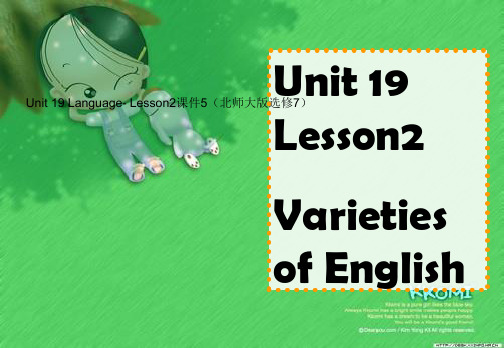
7. b) Help me with my bags, will you? 8. a) I was wondering if you could
help me with my bags.
gkstk精品课件
Now listen and repeat six polite requests. 1. Could you possibly give me a hand with my bags, please? 2. Is it all right if I leave my bags here? 3. I was wondering if I could have breakfast earlier?
3. a) If you’d like to wait a moment, please.
4. a) Could you just wait a moment, please?
5. a) Is it all right if I pay by credit cark. 6. b) I’ll pay by credit card.
5. WAuhsatrt adlidanyou say when he was late?
6. SBorrirtiyshI’m late. I had to pay my bills.
Australian
Hale Waihona Puke gkstk精品课件Listen to the conversation and decide which speaker is American, which is British and which is Australian.
Canada, the USA, Ireland, New Zealand, Australia, Britain. No, The English language has different varieties.
北师大版高一年级下册unit 19《language》lesson 2优秀教案4(重点资料).doc

Unit 19 CommunicationLesson 2 Varieties of EnglishObjectives[To practice listening strategies for identifying different English accentsTo develop awareness of different English expression in different countriesTo discuss the different accents people have when speaking EnglishPre-ListeningHave students name some countries where English is the native language. Then discuss if all these English speakers sound the same. Then show the pictures of some English speaking countries. They are: Australia, Britain, Canada, Ireland, New Zealand, South Africa, Jamaica and the United States.ListeningExercise 2Students work in pairs matching the Key Words to the words with the same meaning in the list.Check answers as a classExercise 3Students discuss what makes the pairs of words different as a whole class.Exercise 4Play the tape once for students then decide if these false statements are true or false.Check answers and correct the false statements.Exercise 5Discuss the question: Why do you think Liang Weimin thought all English speakers sounded like BBC World Service reporters? Exercise 6Learn the Listening Strategies with the class.Play the tape for students to decide whether the speakers are American or BritishPlay again and have students to repeat the sentences. Pay attention to the difference.Exercise7Play the tape for students to decide whether the speakers are Australian or BritishPlay again and have students to repeat the sentences. Pay attention to the difference.Exercise 8Listen to the conversation and decide which speaker is American,which is British and which is Australian.Check answers and ask students to share the rules they have found for the accent from different countries.Exercise 9Read the questions in exercise 9 and get ready for the listening Play the tape twice and then check the answers.Exercise 10First, read the Function File and try to fill the blanks.Play the tape to complete the gaps.Check the answers by playing the tape again.Discuss whether the expressions are polite or impolite, direct or indirect.Exercise 11[Listen and think about language and intonation. Decide which requests are polite and indirect, too direct and possibly rude. After-ListeningExercise 12Learn the Speaking Strategi es together.Work in pairs. Two students role play the situation.HomeworkRead the Culture Corner on page 16 to learn more about the English around the world.。
北师大版高二下Unit19《Language》(Lesson 2)ppt课件

Match the key words with the same meaning in the list
Flat-------apartment Film-------movie Post-------mail Rubbish-----trash Pavement----sidewalk
British accent
Listen to the tape and do exercise 6, 7, and8
Keys to exercise 6 :1.B, 2.A, 3.A, 4.B, Keys to exercise 7: 1.Australian 2. British 3. British 4. Australian 5.British 6. Australian Keys to exercise 8: Jan---British Pattie----American Shane----Australian
Lesson 2 Varieties of English
Look at the following pictures and guess where are they. Tell me what language do they speak as their native/ first language. Do they have different accents?
Listening strategies: Identify the situation and people
1. look at the choices and guess what is going to be talked 2.catch the important words 3.pay attention to the sound effects 4.judge the formal or informal language 5.the intonation of the speaker
北师大高中英语选修七配套课件:Unit 19 Language
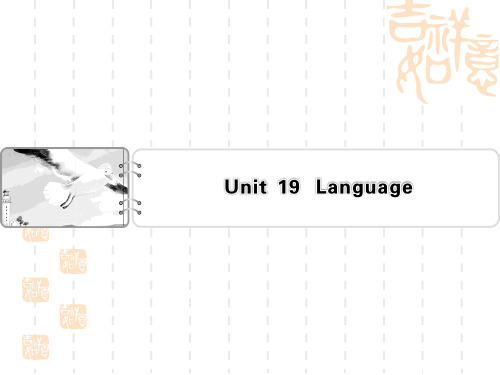
▪ 2.翻译佳句 ▪ 翻译画线句子。
▪ 【答案】事实上,一些概念被用来更好地区 别语言和方言之间不同的程度。
▪ 1.佳句仿写 ▪ ①我把她当作我最好的朋友。 ▪ ②他被认为是班里最聪明的学生。 ▪ ③这本书和那本书内容相似。 ▪ 【答案】①I refer to her as my best friend. ▪ ②He is considered to be/as the cleverest student
▪ According to encyclopedia,human languages are usually referred to as natural languages,
and the science of studying those falls under the linguistics (语言学).A common progress for
natural languages is that they are considered to be first spoken,then written,and then an
understanding and explanation of their grammar
is attempted.
▪ Languages live,die,move from place to place ,and change with time.Any language that ceases to change or develop is categorized as a dead language.In an opposite way,any language that is in a continuous state of change is known as a living language or modern language.
北师大版高中英语选修7unit19Language课件 课件ppt

Find mistakes of style in the letter.
Example1= Hi there
ks5u精品课件
HDi tehaerrSe,ir/Madam II’mamwrwitriintigntgoto ask for…I am very interested in the course but IIwwaonutldsolmike details. Firstly… Secondly, IIdwono’utldsebeewghryatveafurileitfieysoouf Econuglldisehx…plain why Thirdly, yIouresaadytthhaatt there is …BIyn tahdedition way, would I…
closing
ks5u精品课件
ks5u精品课件
Language output: writing a replying letter
Stage 1: Read the letter again. Take notes of the questions in the letter, then find out the information in the advertisement.
2. I won’t get a good grade (provided that/ unless) I study hard.
3. I don’t know (unless/ whether) these diagrams explain the seasons or how the moon moves around the sun.
ks5u精品课件
Paragraph 2 length of the course,holidays
北师大版高中英语选修七Unit 19《Language》(Lesson 2)课件1

Lesson 2 E ngl i sh
V ari et i es of
1. The more different accents you hear, the more confused you get. (Page 8) 你听到的不同口音越多, 你就觉得越混淆。 the+ 比较级. . . the+ 比较级. . . 越……越…… The harder you study, the greater progress you will make. 你学习越努力, 你的进步就会越大。 The more, the better. 越多越好。 The more he eats, the fatter he will be. 他吃得越多, 就会越胖。
形容词/ 副词比较级+ and+ 形容词/ 副词比较级. . . 越来越…… The flowers became more and more beautiful. 这些花儿变得越来越漂亮了。
(1)翻译句子 ①越早越好。 答案: The earlier, the better. ②天变得越来越黑。 答案: It������ s getting darker and darker.
alternative energy 替代能源 an alternative to. . . ……的替代品 have no alternative but to do sth. = have no choice but to do sth. 别无选择只好做…… there is no alternative. . . 别无选择 alternatively adv. 其他地
(2)单项填空 ①As far as I am concerned, education is about learning and the more you learn, . A. the more for life are you equipped B. the more equipped for life you are C. the more life you are equipped for D. you are equipped the more for life 提示: 句意为: “ 在我看来, 教育与学习有关, 你学得越多, 你对生活的准备 就越充分。” 答案: B ②Mr Black is very happy because the clothes made in his factory have never been A. popular B. more popular C. most popular D. the most popular 提示: 句意为: “ 布莱克先生很高兴, 因为他的工厂生产的衣服从来也没 有这么受欢迎过。” 否定词 never 与比较级连用, 表达最高级的含义。 答案: B .
高二英语北师大版选修7 Unit 19 language Writing 课件 (共14张PPT)
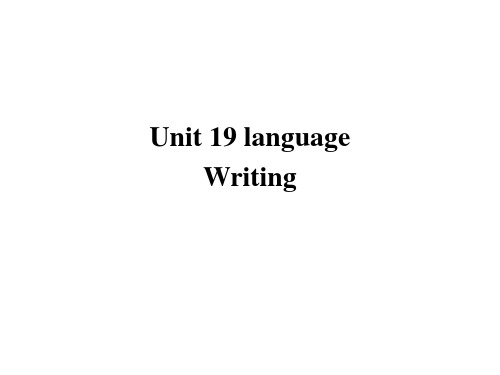
强调句
You had better communicate with people in Chinese in daily life. 强调句:It is the communication with people in Chinese in daily life that helps you a lot.
Dear David,
How are you doing these days? Hearing that you take an interest in learning Chinses, here are some tips for you.
In the first place, spend more time listening to radio and watching videos so that you can have more language input. In addition, communicate with others as much as possible, which contributes to your listening and speaking skills. During communication, try to imitate the pronunciation and accent, which makes you sound more native. Secondly, you had better prepare a notebook and take down unknown words at any time. What’s more, it is a good try to write dairies in Chinese, which is a very useful way to develop your writing and
北师大版高二下unit19《Language》ppt课件
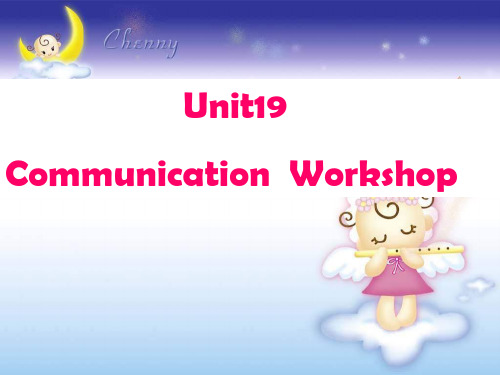
Choose the right words from the brackets.
1. I like going to class (as long as/ unless) it isn’t boring. 2. I won’t get a good grade (provided that/ unless) I study hard. 3. I don’t know (unless/ whether) these diagrams explain the seasons or how the moon moves around the sun. 4. I will start the course in August (provided that/ unless) I get accepted.
5. I don’t like going out on Friday night (unless/ whether) I’ve finished all my work for the week. 6. Going to Thailand for the holidays sound great (as long as/ whether) I’ve saved up enough money. 7. I am not sure ( if / provided that) should write captions for these pictures or not.
Paragraph 2
Paragraphcourse, holidays course content
discount
registration fee
Paragraph 5
qualifications
• Do you think the writer is good at writing? How many mistakes can you find in the letter?
- 1、下载文档前请自行甄别文档内容的完整性,平台不提供额外的编辑、内容补充、找答案等附加服务。
- 2、"仅部分预览"的文档,不可在线预览部分如存在完整性等问题,可反馈申请退款(可完整预览的文档不适用该条件!)。
- 3、如文档侵犯您的权益,请联系客服反馈,我们会尽快为您处理(人工客服工作时间:9:00-18:30)。
Preห้องสมุดไป่ตู้Listening
How many countries can you name where English is the native language? Do all these English speakers sound the same? Show the English speaking countries
Suggested answer He probably learns English by listening to BBC World Service broadcasting and has Never heard any others English accent.
Exercise 6
Listen to the sentences and decide whether they are spoken in an American accent (A) or a British accent (B)
(Exercise 8)
American Australian British
Flat, film, post, rubbish, pavement, subway post 1 mail 2 movie film 3 sidewalk pavement 4 trash rubbish 5 apartment Flat 6 underground subway
Discussion (Exercise 3)
1 Would you like a glass of water? B A 2 She’s dancing in the classroom. A 3 Let me give you an example. B 4 I like to eat tomatoes.
Can you identify a rule for the difference in the American and British pronunciation of the sound 〔a:〕.
Britain
The United States
Australia
New Zealand
Canada
Ireland
South Africa
Jamaica
Look at the key words. Match them to words with the same meaning in the list below. (Exercise 2)
Unit 19 Communication
Lesson 2 Varieties of English
Objectives
To practice listening strategies for identifying different English accents. To develop awareness of different English expression in different countries. To discuss the different accents people have when speaking English
Exercise 7
Now listen to these sentences and decide whether they are spoken in an Australian accent or a British accent.
1 Did you say you are going sailing this weekend? Australian 2 I am going on a date this Saturday! British 3 How much did you pay for your rollerblades? British 4 The mail always comes on Tuesday. Australian 5 What did you say when he was late? British 6 Sorry I am late. I had to pay my bills.
3 The more different accents you hear the more confused you get. F 4 Richard has an Australian English accent.’ T 5 Pam and Robert say “classroom” the same way.
F
Listen again and answer the following question (Exercise 5)
Why do you think Liang weimin thought all English speakers sounded like BBC World Service reporters?
What do you think makes the Key Words different from the words in the list?
Listening
Listen to the dialogue and decide if these statements are true (T) or false (F). Exercise 4 T 1 Pam is America. 2 Robert comes from Australia. F
Australian
Can you identify a rule for the difference in the Australian and British pronunciation of the sound 〔ei〕.
Listen to the conversation and decide which speaker is American, which is British and which is Australian.
